HESTER BURTON British Author, 1913 - 2000
by Jim Mackenzie
Hester Wood-Hill was born on the 6th December, 1913 at Beccles in Suffolk.. She attended Headington School Oxford between 1925 and 1931 and then Oxford University between 1932 and 1936 when she received a honours degree in English. In 1937 she married Reginad W.B. Burton and had three daughters. For a while she was a part-time grammar school teacher and the Assistant Editor of the Oxford Junior Encyclopaedia.
Between 1960 and 1981 she produced eighteen books for children, most of them for the Oxford University Press and many of them illustrated by the incomparable Victor Ambrus. In 1963 she was awarded the Carnegie Medal for Children’s Literature for her story “Time of Trial”. Hester Burton died in 2000.
Hester Burton’s Books for Children:-
The Great Gale 1960 (illustrated by Joan Kiddell-Monroe)
Castors Away 1962 (illustrated by Victor Ambrus)
Time of Trial 1963 (illustrated by Victor Ambrus)
A Seaman at the Time of Trafalgar 1963 (illustrated by Victor Ambrus) OUP (32 pages)
No Beat of Drum 1966 (illustrated by Victor Ambrus)
In Spite of All Terror 1968 (illustrated by Victor Ambrus)
Otmoor for Ever 1968 (illustrated by Gareth Floyd) (Antelope Series for Younger Readers)
Thomas 1969 (illustrated by Victor Ambrus)
Through the Fire 1969 (illustrated by Gareth Floyd)
The Henchmens at Home 1970 (illustrated by Victor Ambrus)
The Rebel 1971 (illustrated by Victor Ambrus)
Riders of the Storm 1972 (illustrated by Victor Ambrus) OUP
Kate Rider 1974 (illustrated by Victor Ambrus)
To Ravensrigg 1976 (illustrated by Victor Ambrus)
Tim at the Fur Fort 1977 (illustrated by Victor Ambrus)
A Grenville Goes to Sea (illustrated by Victor Ambrus)When the Beacons Blazed (illustrated by Victor Ambrus)
Five August Days 1981 (illustrated by Trevor Ridley)
Works of Biography and Criticism:-
Tennyson. Selection and commentary by Hester Burton. OUP 1954
Barbara Bodichon 1827-1891. John Murray,1949
Coleridge and the Wordsworths 1953
Hester Burton's Stories
Hester Burton declared that she liked to find some small real event in English history and show how both boys and girls and young men and women could be caught up in the much bigger picture of national crisis or national change.
Brief accounts of each book appear below. Please feel free to send further details where the information is sparse
.
The Great Gale ("The Flood at Reedsmere" in the U.S.A.)
One January evening in 1953 the sea swept through the neglected defences at Reedsmere in Norfolk. The doctor’s children, Mark and Mary Vaughan, face the dangers alone in their house. Mary rates herself little better than a coward and Mark was constantly in trouble for being foolish and irresponsible. However, their own peril still did not allow them to forget Jim and Hepzie Foulger whose cottage was on the shore itself. The author takes us through the horror of the storm, the terror of the rescue and the misery of the slow rebuilding of the life of the village.
Castors Away
This is a novel based partly on an actual event in England, 1805, where a Sergeant on a military transport apparently dies and is left on the shipwrecked ship. He is rescued by the members of the Henchman family – Edmund, Tom, Nell and their father,a country doctor. Their struggle to save the unfortunate man’s life and then to preserve him from the authorities takes us to Suffolk at the time of the Battle of Trafalgar. The unforgiving nature of military life and the sheer horror of fighting in a ship of the line are convincingly conveyed as the book traces the careers of the different members of the family. At the centre of the book is Nell, a girl whose desire for freedom is always held in check by the fact she is female. This novel was the runner-up for the Carnegie Medal.
Time of Trial
Holly Lane is a little dark bookshop in the shadow of St.Paul’s. This is the home of seventeen year old Margaret Pargeter, her father and her brother John. Britain is engaged in the seemingly never-ending war with Napoleon and France and Margaret’s idealistic father is fighting for the basic human rights of the ordinary people. Criticism of England during the time of war is a dangerous occupation. However, the tragic collapse of a tenement of poor people’s houses stirs the old bookseller to print his pamphlet about a future England in which everything is different. Margaret then undergoes a “time of trial” not just in the courts of law where everything is twisted against her father and justice belongs to the rich, but also at the hands of a destructive mob and a brother who deserts them just when he is most needed. The latter part of the book takes place on the lonely coast of Suffolk where Margaret is snubbed by the father of the man she has come to love and where the army is engaged with the revenue service in destroying the smuggling activities of the local fisherman. This is a story about politics, injustice, suffering, love of one’s fellow man and the other unshakeable love between two idealistic young people whose fate is kept uncertain to the very end. It deservedly won the Carnegie medal in 1963.
No Beat of Drum
Jo and Dick Hinton are farm-labourers in the England of 1830. The introduction of machinery has led to a shortage of work so that many men and their families live a life of poverty and near starvation. Desperate men will take desperate measures and one night the men of Stanton St.Jude rise up in anger and despair against the tyranny of their masters. The Hinton brothers have already be involved in one personal tragedy, the deportation of their foster sister, Mary, for a crime for which they feel guilty. Their own fate is to be the same and, after a brief trial, they too are packed off to Van Diemen’s Land. The suffering of the poor and the intransigence of the lawyers, clergymen and land-owners puts you firmly on the side of the underdog. Life in the new colony brings further suffering, a tragic death and, at last, the possibility of some happiness.
In Spite of All Terror
In the autumn of 1939 most of the schoolchildren of the East End of London were being evacuated in their thousands to the safety of the English countryside. Liz Hawtin, who had suffered for years from being an unwelcome addition to her Aunt Ag’s family, is one fifteen year old who relishes the prospect of a new start with new people and fresh surroundings. Fitting in with the Bruton family proves not to be so easy. However, as they share the common griefs and worries of the war Liz and the family grow gradually closer together. Liz discovers within herself a new person, a girl of courage and adventure that she had never suspected existed. A tremendous book that could be read alongside “Dunkirk Summer” by Philip Turner and “The Dolphin Crosssing” by Jill Paton Walsh to make a wonderful trilogy by our best writers about this crucial time in British history.
Otmoor for Ever (Antelope Series*)Young Jake Tredwell would always remember the day of the Otmoor uprising. The common land of Otmoor is being enclosed by the local rich land-owners as they put up their fences and grow their hedges. His brother Seth is determined to hack his way back to freedom but the militia never sides with the poor. * The Antelope series were intended for children from about six to the age of nine.
Thomas
This is a story of the Civil War and its aftermath, culminating in the tragedy of the Great Plague of 1665. It is also the story of three friends: Thomas, Richard and Richenda who manage to withstand all the differences of background, temperament, loyalties and religious beliefs to remain faithful to each other. Even the jealousy which arises when both Thomas and Richard fall in love with Richenda does not finally destroy it. It is not her choice which brings tragedy to one of them. This novel was placed on the short list for the Carnegie Medal of 1969.
Through the Fire (An Antelope Book)This is the story of the Quakers who were imprisoned in London gaols during the reign of King Charles II. It is a particularly nasty period of oppression that is often covered up by those who extol the so-called virtues of the Restoration of the monarchy. Rachel and Will ride into London with their father to take food to their friends. When the Great Fire of London breaks out they too are trapped.
Kate Rider ("Kate Ryder" in the U.S.A.)In 1646 a young English girl tries to cope with the many pressures, changes and divided loyalties that the continuing Civil War imposes on her family. Hester Burton brings out convincingly the disruptive effects of the long conflict on the lives of an ordinary family. The book draws to its climax during the Siege of Colchester in 1648.
The Henchmans at Home (“The Day that went terribly wrong and other stories” in the U.S.A.)This is a book which is constructed in six inter-linked episodes about the three children in the Henchman family who live in Suffolk during the reign of Queen Victoria. In the first story young Rob runs away in anger on his birthday and then has to face the consequences of his action. In the second 12 year old Ellen has to come to terms with the “fact of life” when her one-time friend Etty abandons her baby. The last story in the book is set at the time of the South African War and finds the more mature Ellen gradually realising how love can unfold from the most unpromising beginning.
The Rebel This is a novel which seems at last partially inspired by events in the life of William Wordsworth at the time of the French Revolution. Catherine Parkin lives with her two brothers Stephen and Josh in the Westmorland town of Camberstock. As orphans they are under the care of their two narrow-minded uncles. Stephen is a passionate lover of freedom and rebels against both the subservient respect paid to local landowners and the country’s attitude to the poor. The story traces his adventures in revolutionary France and Catherine’s slow journey to independence and to love.
Riders of the Storm In 18th-Century England, a teacher in a slum school is charged with conspiracy and fomenting unrest.
To Ravensrigg In late 18th century England a young girl, in trying to find the identity of her real father, is led to the Liverpool slave trade.
Tim at the Fur Fort (An Antelope Book)
Tim’s ambition was to be an explorer like the great David Thompson who had reached the mouth of the Columbia River in 1811. However, most of his time in Canada is spent working over account books as he serves his apprenticeship to the Hudson Bay Company. When disease strikes the lonely outpost of Fort Frederick he has to prove himself by making the most dangerous journey of his life.
A Grenville Goes to Sea (I have no details.)
When Beacons Blazed One sunny day in 1558 Kit Bassett gazed out from his schoolroom window. Outside it looked peaceful enough, yet Kit knew his country was in terrible danger. A sudden change of wind had brought Drake's fleet face to face with the mighty Spanish Armada.
Five August Days (This a children's adventure in East Anglia about which I have no details. )
A letter received in February, 2006.
Dear James,
I wish to thank-you so very much for the excellent information you did on my dear Mum. Shortly after World War 11 Mum wrote a book called "The Reluctant Spy", she used her Maiden name, Hester Wood-Hill. The proceeds from the book helped put food on the table and coal in the shed. I could always tell when Mum had another book on her mind, she would start to cook the meal while still wearing her overcoat and hat. My sisters and I had a marvellous childhood, full of love and support. Dad was very encouraging of Mum's writing career.
Again, thanks very much,
Elizabeth Cloutier.
Blurbs from various editions
Thomas
Richard Holder never forgot his first meeting with Thomas Egerton. It was at Maplehampden, the Egertons' great house by the River Thames, on an autumn day in 1651. Richenda Bradford introduced them, hoping they would become friends. At the time all three of them were seven years old, growing up in an England torn by Civil War and religious strife. At first Richard and Thomas seemed to have nothing in common, but from that riverside meeting sprang the friendship that enveloped tLe three of them. It was no ordinary friendship. It withstood differences of temperament, background, and of religious and political beliefs. It transcended jealousy, even though Thomas and Richard were rivals for Richenda's affections and the time came when she had to choose between them. It spanned years and separations, until the day when the three young people were reunited in London during the Great Plague—a meeting that was to have tragic consequences for one of them.
Castors Away
Set in the early nineteenth century at the time of the Battle of Trafalgar, this story concerns the four children of a Suffolk doctor, who are suddenly jolted from the calm of a country summer by their unexpected and dramatic rescue of a soldier escaping arrest. The story follows Edmund, the eldest of the four, to London, where he studies to be a surgeon, and Tom, the second son, to the terrible dangers and hardships of war at sea. It is their sister Nell, however, who plays the central part, when she realises that she can no longer share in her brothers' activities. She must stay quietly at home in Suffolk, and it is for her that the sailors' cry, 'Castors Away!', heard so often in those days, has a special meaning . . . 'Cast us away ... let us go free!'
. . . Using the two themes, medicine and naval warfare, a story is told with such a multitude of incident, and with the whole knit together so convincingly, that a young reader, once started, is unlikely to want-to put the book down again. The characters are drawn with compelling sincerity and the historical background, convincing in its detail, never dominates either the plot or the characters...
The Henchmans at Home
Set in Victorian England, this collection of six stories is centred on the same characters—Dr. and Mrs. Henchman and their children William, Ellen, and Robert—who live in the small Suffolk town of Rushby, where Dr. Henchman has his practice. The stories span eleven years and spotlight incidents in the children's lives as they grow up. These incidents are sometimes amusing, sometimes moving, and together they make up a family-story full of interest and likeable personalities.
In Spite of All Terror
The Second World War . . . In the autumn of 1939 thousands of schoolchildren were sent away from London to the safety of the country. Among them was Liz Hawtin, who had been living in the East End with her aunt and cousins, where she felt unwanted. For her the evacuation seemed a release, but she soon met difficulties when she found herself in the midst of the Bruton family, so different from her own. She had a hard struggle to overcome these problems and to come to terms with the demands of war.
'. . . the book . . . must be regarded as one of the most outstanding contributions to children's literature of recent years; a book to read and to re-read.'
Time of Trial
'. . . perhaps even for the author of The New Jerusalem the future was not so black. "I have a great belief, Meg, in the common sense of English justice," said her father. "They cannot imprison a man merely for suggesting a way for people to live in greater happiness."
But in the troublous London of 1801 they could. Only a few weeks after this discourse with his daughter, Stephen Pargetcr, bookseller of Holly Lane, was arrested for writing and publishing seditious libel, 'to stir up resentment among the poorer people against the Government'. With her father in prison, and their bookshop pillaged by the mob, Margaret goes to live in humble lodgings on the Suffolk coast, where her life takes an unexpected turn.
'The book excels because all the situations are so vividly portrayed . . . The social evils of the early nineteenth century arc part and parcel of the story. Their presence and ubiquity arc courageously tackled without bias or smugness.'
The Rebel
Set at the end of the eighteenth century, in a period of revolution and social upheaval, this is the story of three orphans—Stephen, Catherine and Josh Parkin—who have been left to the unloving care of their two narrow-minded uncles and their foolish aunt on their uncles' farm in the Westmorland town of Camberstock. Stephen's rebellious refusal to take part in the Centenary Celebrations of 1788 earns his uncles' disapproval and results in a disruption of all their lives. He himself is banished from the farm, until it is time for him to go up to Oxford, while fourteen-year-old Josh, whose ambition is to own a farm, is sent to sea; Catherine, whose whole life and expectations revolve round her brothers, stays on at the farm, alone but for her friend Martha. Meanwhile Stephen's passionate love of freedom and defence of the poor take him to France and the Revolution, where he hopes to see for himself the plight of the French peasants. But his experiences are such that he returns to England a sick and broken man, tormented by failure, guilt and disillusionment. Mrs. Burton's moving story portrays the effect of Stephen's frustrated genius and idealism on the lives of Catherine, Josh and Martha, and describes how he comes to accept a different, more realistic, concept of freedom.
Hester Burton
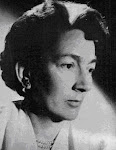

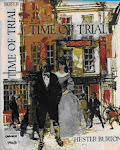



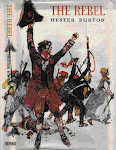

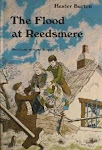

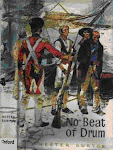

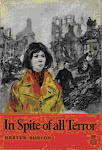
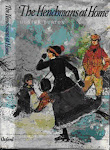
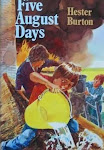
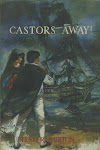
No comments:
Post a Comment